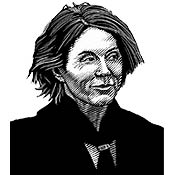
If you should keep your friends close and your enemies closer, it goes without mention you should keep your potential hostile witnesses closest of all. Martha Stewart kept Mariana Pasternak and Ann Armstrong very close indeed—one as her confidante, the other as her assistant. One just down the road, the other right outside her office. One on long holidays, the other on a short leash.
When Pasternak and Stewart met, they weren’t an obvious match: Mariana was foreign-born, an expansive, high-voltage presence. Martha looked downright midwestern and would teach a nation of millions how to stencil within the lines. But their circumstances were similar: They had both married socially appropriate, professional-class husbands, set up house in the same corner of Westport, and found, reportedly, that there wasn’t nearly enough money to go around. Still, they kept up appearances. At one of Martha’s many parties, in fact, a friend of hers chatted up the Pasternaks about an investment opportunity that might ease their problems. Some biotech firm called ImClone. The couple bought in.
By the nineties, both marriages had fallen apart. The women stayed together, though. When Mariana got a real-estate license, Martha, the godmother of her friend’s children, was her client. When Mariana got in financial trouble, Martha helped her out. They traveled together, saw each other every week, spoke constantly. And when Pasternak’s name was first introduced into the court transcript, it was with the title of best friend.
And it was in that capacity that she placed her hand on the Bible, and sold Martha Stewart down the river. While on vacation in Mexico, she said, Martha confided in her about having illegally—or, at the very least, inappropriately—traded on information she should never have been given in the first place. And then, as Pasternak reported, her friend added a cheery thought: “Isn’t it nice to have brokers who tell you those things?”
With that one betrayal, the trial was at last delivered to the bitch-slap soap-opera world of celebrity scandal for which everyone had been waiting. Not only had Martha been aware she was getting away with something—something the little people wouldn’t even know to be envious of—but she had laughed about it at a $1,500-dollar-a-night resort. And then her best friend ratted her out!
By the next day, however, Pasternak was in a more philosophical frame of mind. Upon reflection, she told the court, “I do not know whether that statement was made by Martha or was a thought in my mind.” The friendship was so close, it seems, that even their unspoken thoughts were communal property. She went on, “I do not know if Martha said that or it’s me who thought those words.”
Isn’t it nice to have friends who tell prosecutors those things?
Ann Armstrong might be Mariana Pasternak’s genetic opposite, a quiet, dutiful woman who dresses so as not to be noticed and spends her spare time at Broadway shows rather than Hamptons parties. She belongs to that breed of self-abnegating helpmates that evolved to live in the shadow of the superpredators. After Martha altered the phone logs, Ann sat down at the keyboard and cleaned up her boss’s spelling and punctuation—it was, she said, a reflex.
While she was testifying, Armstrong recounted the eleven-minute phone conversation she had with Stewart the day the shares were sold. “We talked about the holidays,” Armstrong recalled. “I thanked her for the plum pudding she sent.” And then, sitting in the witness box, she broke down and wept until the judge adjourned the proceedings.
What brought on the tears? Was it gratitude? Fear? The dawning realization that normal bosses give cash bonuses? Or was it six years of compounded terror finding their inevitable release?
Or was it, instead, an awestruck recollection of that pudding, so rich, so dense, so delicately flavored? Most of us will never know: The recipe is no longer on the Website. And by next Christmas, its author may no longer have access to a kitchen.


The Heroine
By Stephanie Zacherek
Amidst the crush, she was alone.

The Betrayer
By Simon Dumenco
He looked innocent.
PLUS